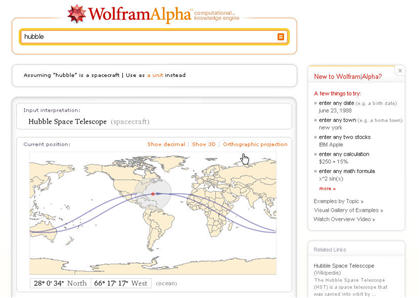A David has just arisen to take on the Goliath that is Google: Wolfram|Alpha, a search engine which serves up formatted answers to questions rather than provide just a list of links. As of this writing, it was scheduled <A target="new" http: herf="to go live this Monday.
What is it?
This “computational knowledge engine” (as it calls itself) is the brainchild of Stephen Wolfram, the founder of Wolfram Research. The company’s most well-known product to date is Mathematica, a computational application that is used by mathematicians, scientists and other technicians.
Wolfram|Alpha’s mission is to go beyond simply finding and listing links to Web sites, and instead to pull the needed data from those sites and provide users with the answers to their questions. In other words, it will travel through Web sites so you don’t have to.
What does it do?
Wolfram|Alpha gathers data based on your search terms and presents you with the answers in a well-formatted structure, using charts, graphs and other visual aids. For example, if you want to compare statistics about several different cities, you type in their names and find out that, say, Tokyo has several thousand more people than New York.
What’s cool about it?
If you’re of a scientific bent, this could be a great resource, once Wolfram Research beefs up its informational sources. It lays out the data in easy-to-read, well-formatted pages that include a variety of charts and graphs.
For example, when I typed in “Hubble,” it came up with some interesting facts about the Hubble Space Telescope, including its current position and original launch date. Typing in “ISDN” brought up various comparative speeds and the time needed to transfer 100 kilobytes of data. And typing in “Cheerios” got me more information than I needed to know about the cereal’s nutritional components.
What needs to be fixed? A lot.
While it’s fun to play with Wolfram|Alpha, unless you’re a mathematician or a scientist you’re not going to get a great deal out of it in its current iteration. Because much of the information that appears in its pages is apparently derived from “Wolfram|Alpha curated data,” there is a lot — a whole lot — it can’t find or understand.

I tested Wolfram|Alpha about five days before it was set to launch, and it didn’t take much to find its limits. Too many times, the simplest query (such as “kidney cancer”) brought up the message “Wolfram|Alpha isn’t sure what to do with your input.”
One thing that the company suggests you try as a test of the engine is to type in your home town. I live in Brooklyn, New York — a place that is, I believe, not unknown to either mapmakers or movie directors — and so I typed “Brooklyn” into the search engine.
The best guess that Wolfram|Alpha was able to come up with was Brooklyn, Connecticut. It also suggested (as a possible alternative) Brooklyn, Ohio. There is a “more” drop down menu (in case the first alternative isn’t enough) which listed Brooklyns in Michigan, Wisconsin, Indiana and Iowa. When I finally typed in “Brooklyn, NY,” I got a page comparing the population and elevation of the town of Brooklyn, Conn. to that of NY State.
Ornithologists may also find it rather frustrating: A search on “blue heron” got me the scientific names and the taxonomy of the bird, but nothing about its flight path, physical characteristics, call, reproductive habits or any other pertinent information. A search on “mockingbird” was a bit more successful; it included other names by which the bird was known, but not much more information.
Wolfram does include a source listing for its entries, but there’s no indication which specific facts come from where. A rather spare entry about Napoleon Bonaparte included (when I clicked on “Source information”) a general list of references that included both the Encyclopedia Britannica and Wikipedia. But the primary source was “Wolfram/Alpha curated data.”
Final verdict
Wolfram|Alpha is fun to play with, and introduces an original format for finding information on the Web. As it currently stands, it may be useful for mathematical and scientific research. However, until it aggregates a lot more data, and learns to handle more complex user queries, this interesting experiment is no danger to Google.
In this case, David is lobbing equations at Goliath instead of stones – which may be impressive, but certainly won’t kill any giants.
Source: Computerworld.com




